

| Photo | Description |
|---|---|
 |
William BrooksWilliam Brooks is Professor of Music at the University of York, England, and also Emeritus Professor at the School of Music, University of Illinois. He has written widely on American music in journals and in publications like The Cambridge History of American Music, to which he contributed the two overview chapters. He is recognized as an authority on John Cage and Charles Ives and has several publications on the practice and significance of experimental music. He is also a composer, known best for his works for voice, sometimes with electronics. Today's paper is part of an ongoing study of the music of World War I being conducted primarily at the Belfer Audio Archive, the Sousa Archives and Center for American Music at the University of Illinois, and the Center for Popular Music at Middle Tennessee State University. |
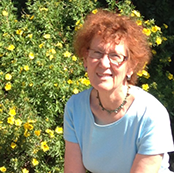 |
Marcia J. CitronMarcia J. Citron is Lovett Distinguished Service Professor of Musicology at the Shepherd School of Music, Rice University. Her main research areas are the intersection of opera and film, and gender and music. She is the author of the books When Opera Meets Film (Cambridge UP, 2010) and Opera on Screen (Yale UP, 2000), as well as many articles, and has forthcoming essays on opera and visual media in the Oxford Handbook of Opera and the Oxford Handbook of Film Music. In the area of gender she published Gender and the Musical Canon (1993, reprint 2000), which won the Pauline Alderman Prize for best book on women and music, and volumes devoted to Cécile Chaminade (1988) and Fanny Mendelssohn Hensel (1987). In 2012 she was awarded Honorary Membership (for lifetime achievement) by the American Musicological Society, and she has served the organization in several roles, including member of the Board of Directors and several awards committees. Citron has won research fellowships from the DAAD (German Academic and Research Exchange) and the National Endowment for the Humanities. Event: Syracuse Symposium 2013: Exploring Psychological Film Music Through Spellbound and Rebecca |
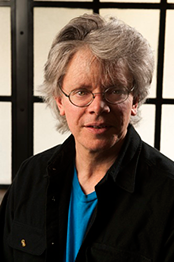 |
David HarringtonViolinist David Harrington is the founder and Artistic Director of the Kronos Quartet. For 40 years, San Francisco's Kronos Quartet has combined a spirit of fearless exploration with a commitment to continually re-imagining the string quartet experience. In the process, Kronos has become one of the world's most celebrated and influential ensembles, performing thousands of concerts worldwide, releasing more than 50 recordings, collaborating with many of the world's most intriguing and accomplished composers and performers, and commissioning more than 800 works and arrangements for string quartet. A Grammy winner, Kronos is also the only recipient of both the Polar Music Prize and the Avery Fisher Prize. Integral to Kronos' work is a series of long-running, in-depth collaborations with many of the world's foremost composers, including Americans Terry Riley, Philip Glass, and Steve Reich; Azerbaijan's Franghiz Ali-Zadeh; Poland's Henryk Górecki; and Serbia's Aleksandra Vrebalov. Additional collaborators in concert and/or on disc have included Chinese pipa virtuoso Wu Man, performance artist Laurie Anderson, Azeri vocalist Alim Qasimov, legendary Bollywood playback singer Asha Bhosle, Inuit throat singer Tanya Tagaq, and rockers Tom Waits, Amon Tobin, and the Icelandic group Sigur Rós. The quartet spends five months per year on tour, appearing in the world's most prestigious concert halls, clubs, and festivals. Kronos is equally prolific and wide-ranging on recordings, including the Nonesuch Records releases Pieces of Africa (1992), a showcase of African-born composers that simultaneously topped Billboard's Classical and World Music lists; Nuevo (2002), a Grammy- and Latin Grammy-nominated celebration of Mexican culture; the 2004 Grammy-winner, Alban Berg's Lyric Suite; and Music of Vladimir Martynov (2011). With a staff of ten based in San Francisco, the non-profit Kronos Performing Arts Association (KPAA) manages all aspects of Kronos' work, including the commissioning of new works, concert tours and home-season performances, and education programs. Event: Kronos Quartet Concert |
John Harvith and Susan Edwards HarvithJohn Harvith and Susan Edwards Harvith are mass communications and arts historians who together have produced exhibitions and film series, as well as books and articles. The initial research for their book began at Belfer. Edison, Musicians, and the Phonograph won critical praise from The New York Times and Musical America and has since been frequently cited in publications dealing with Edison, as well as the aesthetics of recorded performance. Their complementary research has emphasized the interface between the arts and technology in film, photography, radio, and television, resulting in numerous interviews with cinematographers, film editors, and – for SU’s Bleier Center for Television and Popular Culture – radio and television pioneers. Event: The Cultural Implications of Audio Archiving |
|
 |
Susan Edwards HarvithSusan Edwards Harvith earned her BA degree in theater at Wayne State University and her Master of Museum Practice degree at the University of Michigan, receiving her training as a museum professional in American studies at the Henry Ford Museum. She served as curator of exhibitions at the Cranbrook Academy of Art/Museum, an administrator at Oberlin College’s Allen Memorial Art Museum, and executive director of the Santa Cruz County Historical Trust, before devoting herself for the past 22 years to the teaching of film history, first as an adjunct professor at SU and more recently at Oasis in Syracuse. |
|
|
John HarvithJohn Harvith earned his BA degree in music history at the University of Michigan (U-M), Phi Beta Kappa, where he also earned the JD degree. He served as the principal classical music critic of The Ann Arbor News and Michigan correspondent for Musical America in the 1970s. He then turned his attention to the world of education, serving, in succession, as cultural affairs writer for U-M’s News Services; head of public affairs for Interlochen Center for the Arts; director of news services for Oberlin College, at which he taught Winter Term courses in music criticism; executive director of national media relations at SU; and senior associate vice chancellor in the Office of Public Affairs at the University of Pittsburgh, from which post he is retiring as of Oct. 31, 2013. |
 |
Stephen MeyerStephen Meyer is an Associate Professor in the Department of Art and Music Histories at Syracuse University. He is the author of Carl Maria von Weber and the Search for a German Opera, and has published articles in numerous scholarly journals, including the Journal of the American Musicological Society, 19th-Century Music, The Musical Quarterly and the Cambridge Opera Journal. His most recent articles concern the history of the sound recording of Wagner’s Grail operas; the role of technology in the early music movement, and the question of medievalism in film music. At present, he is completing a book project Epic Sound: Music in Postwar Hollywood Biblical Films. In January 2015, he will be assuming the Editor-in-Chief position of the Journal of Music History Pedagogy. Event: Exploring Psychological Film Music Through Spellbound and Rebecca |
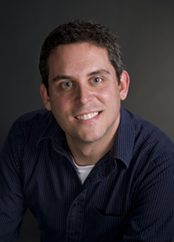 |
Louis NieburLouis Niebur is Associate Professor of Music at the University of Nevada, Reno. He received his Ph.D. in musicology at UCLA in 2004. His field of specialization is the development of electronic music in Britain, primarily through the mediums of radio and television. Dr. Niebur's work concerns the multiple interpretations of musical modernism in art, both popular and art, high and low, abstract and melodic as mediated through technology. This has led him to explore how film and television has served as one of the key locations for the representation of the "modern" and "futuristic" in post-war America and Britain. His book, Special Sound: The Creation and Legacy of the BBC Radiophonic Workshop was published in 2010 by Oxford University Press. Event: Exploring Psychological Film Music Through Spellbound and Rebecca |
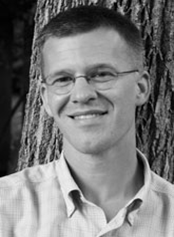 |
Nathan PlatteNathan Platte teaches musicology at the University of Iowa. His research on Hollywood film music has appeared in The Journal of Musicology, 19th-Century Music, Music and the Moving Image, and The Journal of Film Music. Other recent publications include The Routledge Film Music Sourcebook (Routledge, 2011; coedited with James Wierzbicki and Colin Roust), Franz Waxman’s “Rebecca”: A Film Score Guide (Scarecrow Press, 2012; coauthored with David Neumeyer), and an article in Music, Sound, and Filmmakers: Sonic Style in Cinema (Routledge, 2012). In 2012 his dissertation received the Society for American Music’s Wiley Housewright Dissertation Award. He is currently writing a book on music in the films of David O. Selznick. Event: Exploring Psychological Film Music Through Spellbound and Rebecca |
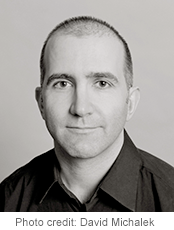 |
Alex RossAlex Ross has been the music critic of The New Yorker since 1996. His first book, The Rest Is Noise: Listening to the Twentieth Century, won a National Book Critics Circle Award and the Guardian First Book Award, and was a finalist for the Pulitzer Prize. He has also published an essay collection, Listen to This. Ross has received a MacArthur Fellowship and an Arts and Letters Award from the American Academy of Arts and Letters. Event: In Conversation: Kronos Quartet Concert |
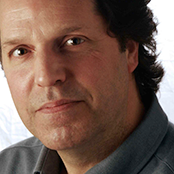 |
Paul ThébergePaul Théberge is a Canada Research Professor at Carleton University (Ottawa), where he is cross appointed to the Institute for Comparative Studies in Literature, Art and Culture and to the School for Studies in Art and Culture (Music). He has published widely on issues concerning media, technology and music and his present research addresses the evolving relationship between music and the Internet, the history of sound recording, and the role of sound and music in visual media. His award-winning book, Any Sound You Can Imagine: Making Music / Consuming Technology (1997), was concerned with digital musical instruments, the industries that design and promote them, and their meaning for the musicians who use them. Among his more recent projects is Glenn Gould: The Acoustic Orchestrations (2012), a 2-CD release produced for Sony Classical, which includes Théberge’s reconstruction of an experimental recording originally made by Glenn Gould in 1970 but never fully realized during his lifetime. Event: Opening Lecture: Sound, Memory, and the Psychoanalytic Century |
| Photo | Description |
|---|---|
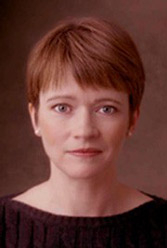 |
Janet Brown, sopranoSoprano Janet Brown is a professor of practice of music at the Syracuse University Setnor School of Music. She is at home on operatic stages, having performed roles with the Syracuse Opera Company, the American Repertory Theatre, the Boston Early Music Festival, and the Pepsico Summerfare music festival. In concert, she has performed major oratorio roles with the Syracuse Symphony, the West Virginia Symphony, the Cantata Singers of Boston, the Spectrum Singers of Boston, the New England Bach Festival, the Northwest Bach Festival, Handel & Haydn Society, Emmanuel Music of Boston, and the Tallahassee Symphony, to name a few. Ms. Brown is also a frequent recitalist with the Skaneateles Chamber Music Festival and has appeared in concerts of new music with the Syracuse-based Society for New Music and Boston’s Collage New Music. Ms. Brown has premiered works by composers Gunther Schuller, Andrew Imbrie, Philip Glass, Nicolas Scherzinger, Edward Cohen, Howard Boatwright, and Ernst Bacon. In addition to her critically acclaimed CD release of selections from the Spanisches Liederbuch of Hugo Wolf, she can be heard on the recording Fond Affection: Music of Ernst Bacon. Ms. Brown received a bachelor of music from the Crane School of Music, SUNY Potsdam, and a master of music from the Syracuse University Setnor School of Music. |
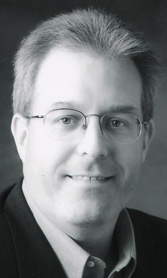 |
Steven Heyman, pianistSteven Heyman is an associate professor of music at the Syracuse University Setnor School of Music. He has appeared in solo recitals, chamber music concerts, and as concerto soloist throughout the United States, Canada, and Europe. In New York, he has appeared in Lincoln Center, Columbia University, Carnegie Hall, and as an invited artist for a Juilliard tribute to the late legendary artist/teacher Adele Marcus. Mr. Heyman has won prizes in over a dozen national and international competitions. In the Central New York area, he has an active performing career, including being the soloist with the Syracuse Symphony Orchestra 27 times over a 35-year period. Very active in new music, Mr Heyman has been involved in dozens of premieres, including in Mexico, Europe, and Asia, and has CD recordings on the Opus One, Leonarda, Renegade Classics, Innova, and Squires labels. Recent CD releases include a double CD on Innova dedicated to new music, titled Serendipity (commissioned by the Syracuse Society for New Music), and one for Centaur, titled Echoes, featuring premiere recordings of works for viola and piano with Laura Klugherz. Several composers have written and dedicated music for Mr. Heyman. He has played with the nationally recognized and award-winning ensemble, the Society for New Music, for over 25 years and received a special tribute from this organization in 2008. Mr Heyman is an associate professor and co-chair of the Keyboard Department at Syracuse University, where he has been the recipient of the School of Music’s Most Outstanding Faculty Member Award. At the conclusion of a residency at the Shenyang Conservatory of Music in China, he was appointed a visiting professor. He received his education at the Juilliard School as a scholarship student of Adele Marcus and at the Hochschule für Musik und darstellende Kunst in Vienna with Hans Graf. |
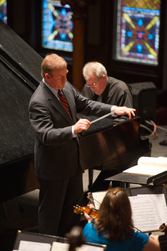 |
James R. Tapia, conductorJames R. Tapia is an associate professor of music and director of orchestral activities at the Syracuse University Setnor School of Music. He is music director of the Syracuse Summer Festival Orchestra, and also conducts the Central Winds and Syracuse Youth Orchestra. For four years, he held an appointment at the University of Michigan, serving as associate director of ensembles and holding the Donald R. Shepherd Chair in Conducting. He was also the music director/conductor of the renowned Michigan All-State Orchestra and Band. Mr Tapia began his professional conducting experience with the Tampa Bay Symphony, as assistant conductor, and has conducted the Syracuse Symphony Orchestra, the Austin Bach Festival Orchestra, the Detroit Chamber Winds and Strings, and the Dallas Wind Symphony, along with numerous conducting experiences in the academic arena. He has worked with distinguished conductors and teachers Pierre Boulez, Gustav Meier, Fiora Contino, Louis Lane, Jerry Junkin and Fred Fennell. Dr. Tapia has received praise from composers Leslie Bassett, Michael Daugherty, Karel Husa, Donald Grantham and Andrew Meade for his insightful interpretations of their works. He maintains an active schedule as a guest conductor, clinician, and adjudicator. |